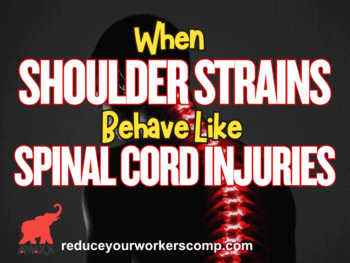
Additionally, those with chronic pain often have increased rates of depression, anxiety, and fear, all of which are exacerbated in a situation such as the current pandemic. The increased reactions to the stress can intensify the pain they already have. The heightened pain may lead to relapses for those prone to substance abuse.
These injured workers are at higher risk of having poor outcomes, potentially landing them in the emergency room. It is more important than ever for workers’ compensation stakeholders to pay increased attention to identify and address the unique needs of patients with chronic pain in the current environment.
Click Link to Access Free PDF Download
“How Do I Get My Adjusters To Follow My Account Handling Instructions?”
Communication
Many injured workers with chronic pain may have had their treatment regimes interrupted due to provider offices closing, or their fears of contracting the virus by going to a provider’s office. Their physical therapy sessions may be on a temporary hold.
While these workers may have been given instructions for at-home exercises or other self-treatments, those managing their claims must ensure these workers are adhering to the guidelines. Part of that involves allaying their fears.
It starts with frequent and appropriate communication. Injured workers in chronic pain often feel isolated, and the current environment makes it that much worse. Having a person to talk to on a somewhat regular basis can go a long way toward helping him. Tips for these conversations include:
- Ask how the injured worker is doing and what he is doing. This gets him to focus more on his activity rather than on his pain
- Discuss his concerns — about the virus, his situation, and his treatment going forward. While focusing too much on his pain is detrimental, it’s also important to be honest with the worker and allow him to express his worries
- Express empathy. Those speaking with injured workers need to understand that this is a dramatic change and be sensitive to that.
- Reinforce healthy behaviors. Ask the injured worker what she is doing for physical activity, what she is eating, whether and to what extent she is smoking and/or drinking alcohol. The idea is not to reprimand the worker but to explain how such unhealthy habits can exacerbate her pain and anxiety.
- Psychologists and others overseeing the injured worker’s care should ask whether anything has changed recently; and encourage them to stay in touch with their primary care physician and specialty provider, if there is one
These workers often have poor coping skills to begin with, so keeping tabs on them and staying in close contact is vita
Virtual Help
Online tools have exploded in the workers’ compensation system since stay-at-home restrictions have been issued. From physical therapists to psychologists and medical providers, there are many ways injured workers can stay in touch with those helping their recoveries.
Some injured workers may be unaware of these options or challenged to make the connections. Those working with the injured worker can provide information if any of the worker’s providers are doing virtual visits. If internet issues are present, phone visits are another option.
Online support groups are also available to help injured workers feel connected to others who may be in similar situations.
Advice for the Injured Worker
In addition to learning how the injured worker is faring during the pandemic, claims managers can also encourage her to do the following:
- Stay connected, to family members, friends, neighbors, and colleagues. This can help reduce the worker’s feelings of isolation.
- Stay active. This is essential to both physical and mental health. Simple stretching, strength training, balance, and flexibility help the person’s mind and body. Online workout classes are available.
- Undertake self-care, such as journaling, meditating, cooking, or making daily gratitude lists.
- Get adequate and routine sleep. Sticking to a regular sleep schedule is imperative for mind and body health, especially when someone is in chronic pain and susceptible to emotional problems.
- Avoid poor eating habits. Processed foods, sugar, fried foods and trans fat can increase inflammation, which makes chronic pain worse.
Conclusion
Injured workers with chronic pain need targeted interventions during normal times. The stressful environment created by the coronavirus has intensified that need. Failing to do so can quickly derail these claims and result in very poor outcomes.

Contact: mstack@reduceyourworkerscomp.com.
Workers’ Comp Roundup Blog: https://blog.reduceyourworkerscomp.com/
©2020 Amaxx LLC. All rights reserved under International Copyright Law.
Do not use this information without independent verification. All state laws vary. You should consult with your insurance broker, attorney, or qualified professional.





























